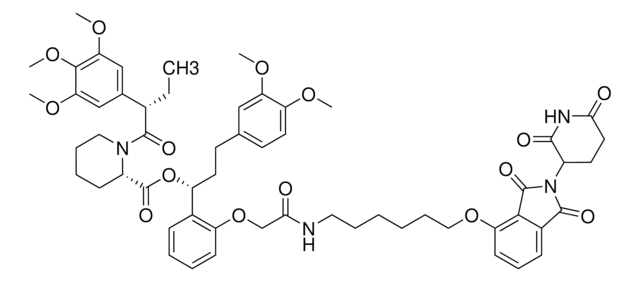914223
Biotin-SLF
Synonym(s):
(R)-3-(3,4-Dimethoxyphenyl)-1-(3-(4,18-dioxo-22-((3aS,4S,6aR)-2-oxohexahydro-1H-thieno[3,4-d]imidazol-4-yl)-8,11,14-trioxa-5,17-diazadocosanamido)phenyl)propyl (S)-1-(3,3-dimethyl-2-oxopentanoyl)piperidine-2-carboxylate, Bio-SLF, Biotin-conjugated FKBP12WT-directed ligand, Biotin-conjugated SLF ligand, FKBP12WT affinity probe for PROTAC® and targeted protein degradation research
About This Item
Recommended Products
ligand
biotin
Quality Level
form
powder
storage temp.
−20°C
SMILES string
O=C(CCC(NCCOCCOCCOCCNC(CCCC[C@@H]1SC[C@@](N2)([H])[C@]1([H])NC2=O)=O)=O)NC3=CC([C@H](OC([C@@H]4CCCCN4C(C(C(C)(C)CC)=O)=O)=O)CCC5=CC=C(OC)C(OC)=C5)=CC=C3
Application
Related tools:
Additional bifunctional tools for FKPB12 variants:
- dTAG-13 (SML2601) for FKBP12F36V; and KB02-SLF (914738), KB03-SLF (914975), and KB04-SLF (913715) for FKBP12WT
- Cereblon (CRBN) affinity probe: Biotin-Thalidomide (913979)
Other Notes
Legal Information
related product
Storage Class Code
10 - Combustible liquids
WGK
WGK 3
Flash Point(F)
Not applicable
Flash Point(C)
Not applicable
Choose from one of the most recent versions:
Certificates of Analysis (COA)
Sorry, we don't have COAs for this product available online at this time.
If you need assistance, please contact Customer Support.
Already Own This Product?
Find documentation for the products that you have recently purchased in the Document Library.
Our team of scientists has experience in all areas of research including Life Science, Material Science, Chemical Synthesis, Chromatography, Analytical and many others.
Contact Technical Service


![Tris[(1-benzyl-1H-1,2,3-triazol-4-yl)methyl]amine 97%](/deepweb/assets/sigmaaldrich/product/structures/179/695/86a721c8-2a4c-4e4f-bc36-6276ce7a941f/640/86a721c8-2a4c-4e4f-bc36-6276ce7a941f.png)





